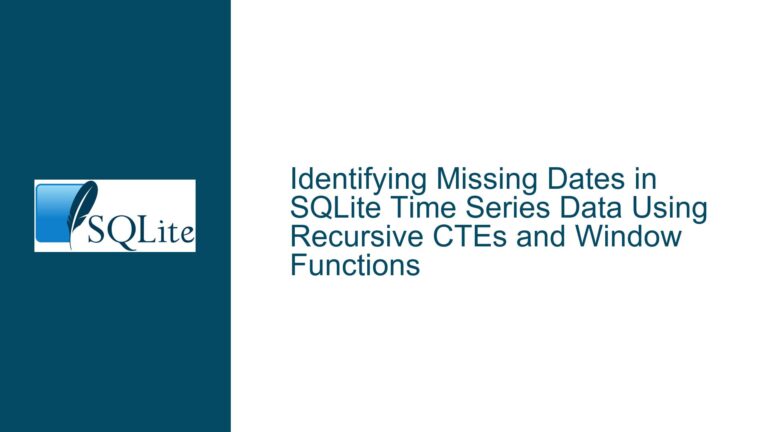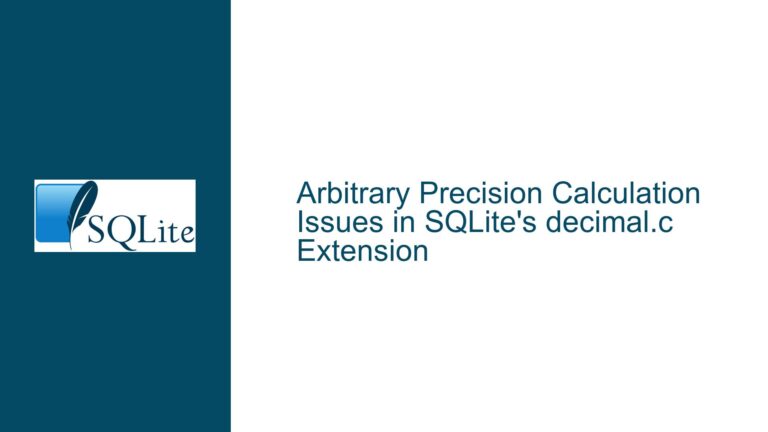JSON Extraction Fails with PostgreSQL-Style Path on Numeric String Names
Issue Overview: JSON Path Extraction Inconsistencies in SQLite
When working with JSON data in SQLite, developers often rely on the json_extract function to retrieve specific values from JSON objects. However, a notable inconsistency arises when attempting to extract values using PostgreSQL-style path syntax, particularly when the JSON key consists solely of numeric characters. This issue manifests when the key, such as "1", is referenced in a PostgreSQL-style path, resulting in an unexpected NULL return value instead of the expected value.
For example, consider the following JSON object: {"1":"one"}. Using the standard SQLite json_extract function with the path $.1 correctly returns "one". Similarly, the MySQL-style path syntax -> '$.1' also returns "one" as expected. However, when using the PostgreSQL-style path syntax -> '1', the function unexpectedly returns NULL. This discrepancy highlights a critical bug in SQLite’s handling of JSON paths, specifically when dealing with numeric string keys in PostgreSQL-style syntax.
The core of the issue lies in how SQLite interprets JSON paths in different syntax styles. While the standard and MySQL-style paths correctly identify the key "1" as a string, the PostgreSQL-style path appears to misinterpret the key as a numeric index, leading to the failure in value extraction. This behavior is particularly problematic for developers migrating from PostgreSQL or those who prefer PostgreSQL-style syntax for JSON path references.
Possible Causes: Misinterpretation of Numeric String Keys in PostgreSQL-Style Paths
The root cause of this issue stems from SQLite’s internal handling of JSON paths, specifically in the context of PostgreSQL-style syntax. When a JSON key consists solely of numeric characters, such as "1", SQLite’s parser appears to treat the key as a numeric index rather than a string. This misinterpretation occurs because PostgreSQL-style paths do not explicitly differentiate between string keys and numeric indices in the same way that standard or MySQL-style paths do.
In standard JSON path syntax, the $. prefix explicitly denotes that the following key is a string, ensuring that keys like "1" are treated as strings regardless of their content. Similarly, MySQL-style paths use the -> operator with a quoted path, which also ensures that the key is interpreted as a string. However, PostgreSQL-style paths omit the $. prefix and rely solely on the key itself, which can lead to ambiguity when the key is numeric.
For instance, in the path -> '1', SQLite’s parser may attempt to interpret '1' as an array index rather than a string key. Since JSON objects use string keys, this misinterpretation results in a failure to locate the key "1", causing the function to return NULL. This behavior is inconsistent with both the standard and MySQL-style paths, which correctly interpret "1" as a string key.
Additionally, this issue may be exacerbated by differences in how SQLite and PostgreSQL handle JSON path syntax. PostgreSQL’s JSONB implementation is more lenient in interpreting paths, allowing for both string keys and numeric indices without explicit differentiation. SQLite, however, appears to enforce stricter parsing rules, leading to the observed inconsistency.
Troubleshooting Steps, Solutions & Fixes: Addressing JSON Path Extraction Issues
To resolve the issue of JSON extraction failing with PostgreSQL-style paths referring to numeric string names, developers can employ several strategies. These include modifying the JSON path syntax, updating SQLite to a version with the fix, or implementing custom workarounds for legacy systems.
1. Modify JSON Path Syntax
The simplest solution is to avoid using PostgreSQL-style paths when dealing with numeric string keys. Instead, developers should use standard or MySQL-style paths, which explicitly treat keys as strings. For example, instead of -> '1', use json_extract('{"1":"one"}', '$.1') or '{"1":"one"}' -> '$.1'. This ensures that the key "1" is correctly interpreted as a string, avoiding the ambiguity that leads to the extraction failure.
2. Update SQLite to the Latest Version
As noted in the forum discussion, this issue has been fixed in a recent update to SQLite. Developers should ensure they are using the latest version of SQLite, which includes the fix for this bug. The fix, implemented in commit de8182cf1773ac0d0, addresses the misinterpretation of numeric string keys in PostgreSQL-style paths, ensuring consistent behavior across all path syntax styles.
To update SQLite, download the latest source code or precompiled binaries from the official SQLite website. After updating, verify that the issue is resolved by running the problematic query and confirming that the expected value is returned. For example, the query SELECT '{"1":"one"}' -> '1'; should now return "one" instead of NULL.
3. Implement Custom Workarounds for Legacy Systems
In cases where updating SQLite is not feasible, developers can implement custom workarounds to handle numeric string keys. One approach is to preprocess JSON objects to rename numeric keys, ensuring they are not misinterpreted. For example, a numeric key like "1" could be renamed to "key_1" before being stored in the database. This avoids the ambiguity in path interpretation while preserving the data’s structure.
Another workaround is to use SQLite’s json_each function to iterate over JSON objects and extract values programmatically. This function returns a table of key-value pairs, allowing developers to filter for specific keys without relying on path syntax. For example:
SELECT value
FROM json_each('{"1":"one"}')
WHERE key = '1';
This query correctly returns "one" regardless of the key’s format, providing a reliable alternative to path-based extraction.
4. Validate JSON Path Syntax in Application Code
To prevent similar issues in the future, developers should validate JSON path syntax in their application code. This includes ensuring that paths are correctly formatted and that numeric string keys are explicitly treated as strings. For example, application code could automatically prepend $. to paths when using PostgreSQL-style syntax, ensuring consistent interpretation across all keys.
5. Leverage SQLite’s JSON1 Extension Features
SQLite’s JSON1 extension provides a robust set of functions for working with JSON data. Developers should familiarize themselves with these functions and their nuances to avoid common pitfalls. For example, the json_extract function supports array indexing, which can be used to access elements in JSON arrays. However, this feature should be used with caution when dealing with JSON objects, as it can lead to misinterpretation of numeric string keys.
By understanding and leveraging the full capabilities of the JSON1 extension, developers can write more robust and reliable queries, minimizing the risk of issues like the one described in this post.
In conclusion, the issue of JSON extraction failing with PostgreSQL-style paths referring to numeric string names is a nuanced but significant bug in SQLite. By understanding the root cause and implementing the appropriate solutions, developers can ensure consistent and reliable JSON data handling in their applications. Whether through modifying path syntax, updating SQLite, or implementing custom workarounds, these strategies provide a comprehensive approach to resolving this issue and preventing similar problems in the future.






